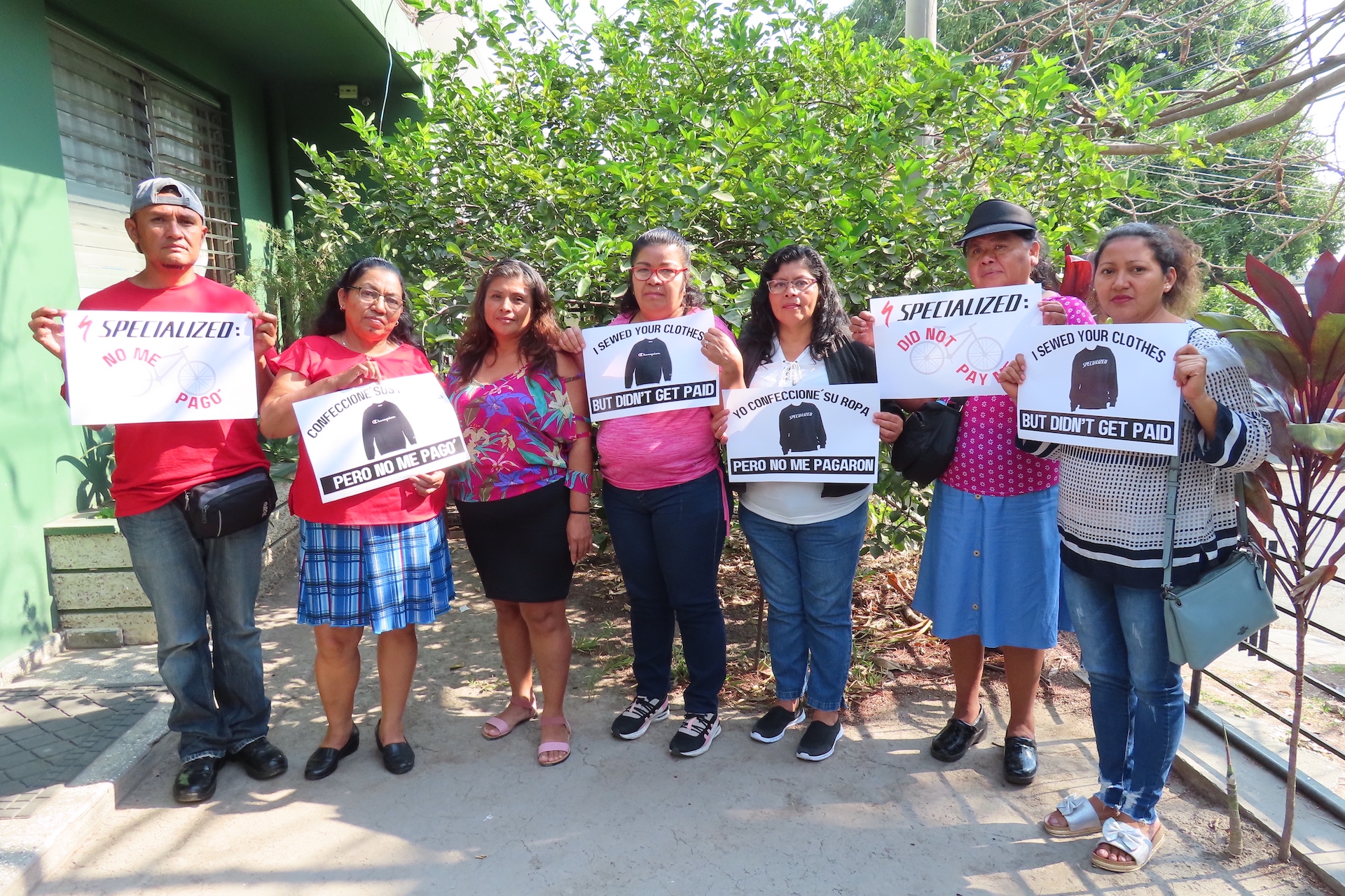Last April, former employees of the failed APS El Salvador garment factory and the non-governmental organizations (NGOs) working with them had a measure of renewed hope. After months of determined work to engage the APS factory’s corporate clients to cover a portion of a huge unpaid wage bill left in the wake of the facility’s sudden closure, the last holdout was finally coming to the table: Specialized Bicycles. Those sustained contacts, accompanied by a public pressure initiative organized by the Clean Clothes Campaign and Green America, appeared to be yielding results, as Specialized informed Escape Collective for our story on the factory closure that it was planning a donation of US$44,238.29 to the workers.
But that hope soon faded. Initial contacts with Specialized withered, and for several months afterward, attempts to re-engage the company went without response, and no payment. Then, on September 17, a breakthrough of sorts: Specialized announced on its web site that it had made what it called a “humanitarian donation of $44k to a court administered fund to ensure the money reaches the workers affected.”
The amount was much less than the workers had hoped to get and didn’t come close to making them whole, but it was something. But a problem soon arose: in the weeks after Specialized’s announcement, neither the workers union nor the NGOs working with them were able to find any information about the company’s claimed contribution, and there’s substantial doubt whether it was ever actually made.
$44,000 no one can find
When APS El Salvador, a maker of casual sportswear that supplied products to a number of major apparel brands, abruptly closed its doors in August of 2022, it owed the 800-odd workers it employed nearly US$2 million in back wages and severance. APS’ parent company, a Chinese entity, had declared bankruptcy, which left the workers just two slim avenues to try to recoup the money owed to them. One was to approach the factory’s clients: Hanes, Gildan (which owns American Apparel), Kellwood, Alwants and Specialized to voluntarily contribute. The other, longer path was a civil court case to seize APS El Salvador’s assets, sell them, and use the proceeds to reimburse the workers.
The workers pursued both approaches. The first has so far secured roughly US$1.4 million in voluntary contributions to an NGO-administered fund from APS El Salvador’s four other clients at the time of the closure; despite its initial pledge, Specialized never contributed. Instead, the company’s September 17 statement indicated it instead intended to work through the court case. But that case, which has proceeded slowly, has not resulted in any recovered funds and won’t for some time. And if it ever does, it does not currently appear to include any money from Specialized, despite the company’s claims.

Walter Catota, an attorney with the federation of Salvadoran garment workers’ unions (FEASIES) that helped organize the civil case, told Escape in an interview that he can find no record of any contribution by Specialized in connection with the case. In fact, he is skeptical it was made at all, for two reasons.
First, the union’s first (and so far only) knowledge of the contribution was an e-mail from a Specialized representative with a link to the online statement. When union officials wrote back asking for details, they received a note referencing a “Fondo Ajena a Custodia del Tribunal” but subsequent attempts to learn more were met with no further response.
Any outside contribution through the Salvadoran government would be noted in court records, and the union would be alerted to the payment, even if it was not able to access the funds yet. That hasn’t happened, said Catota, nor do his contacts in the Salvadoran government have any knowledge of it. A second lawyer associated with both the court case and the distribution of the voluntary, NGO-administered fund, Rhina Juarez of the Organization of Salvadoran Women for Peace (ORMUSA), corroborated that information. Juarez told Escape in an e-mailed response to questions that she is closely monitoring the case and can find no information about the payment in court records or in her contacts with government authorities.
On October 4, Catota told Escape that he had specifically asked about Specialized’s claim of a contribution at a meeting about the case between FEASIES and officials from the Ministry of Labor and the Procuradoría General de la Republic – the Salvadoran equivalent of the Attorney General’s office. “Both of these institutions have denied that any money has been deposited with the government, with the state in any way,” he said.
Second, both Catota and Juarez also said that the case has not reached the point where the court would even be able to accept an outside contribution. Legal documents filed in connection with the case do not list Specialized as formally involved, and in its September 17 statement announcing the claimed contribution, Specialized said explicitly that “Specialized is not a party to this process,” speaking of the case.
Under Salvadoran law, bankruptcy and asset seizure cases are complicated, multi-step processes, said Juarez. “These procedures can last for three to four years,” she said, in part because workers are often not the only creditors, and a court must establish priority.
According to Catota, FEASIES made the first step in the case – formally requesting a claim for unfulfilled payment with the Third Civil and Commercial Court – and the court is currently in the process of executing a seizure of APS El Salvador’s assets. “At that stage of the process,” he said, “it is impossible for someone representing Specialized to join the process to contribute money as humanitarian aid.”
The final word?
More than two years after APS El Salvador’s closure, the workers know that they won’t get anywhere near the full amount owed to them. Wage theft is common in El Salvador, Juarez told Escape. “It’s very common for companies known as maquilas [finished-goods factories, often foreign-owned – Ed.] to stop operating without prior notification to workers or authorities in accordance with the law,” she said.
When they do, Juarez said that the Salvadoran court system often fails to provide “efficient and timely treatment to the demands of workers who have been laid off,” which further deepens the precarious situation for workers, many of whom take months or even years to find new jobs. She said she’s unaware of a single case of an abrupt closure of a foreign-owned textile factory where the employer satisfied all of its economic and social obligations to workers.
The voluntary contributions from APS’ former clients, while welcome, also fall well short of making the workers whole, leaving a nearly $600,000 gap. Again, of the five apparel brands that the Workers Rights Consortium identified as working with APS prior to the closure, Specialized is the only one that has not contributed to the NGO-administered relief fund.
Specialized did not work directly with APS El Salvador, acting instead through an intermediary contract supplier called the Crown Group, which was responsible for placing orders and ensuring the factory met Specialized’s sustainability standards. Those standards underline the brand’s stated commitment to human rights, including pay of “at least the minimum wage required by law or the prevailing industry wage, whichever is higher.” Specialized’s supplier code of conduct also requires factory partners to provide legally mandated benefits, which in El Salvador include severance pay.
In its September statement announcing its claimed contribution, Specialized noted that the APS factory had previously been certified at the highest level for social and labor compliance by independent auditors at WRAP and said that its internal investigation found that the brand’s last order with the factory was in December 2021, and that the Crown Group had paid APS in full in March of 2022.
The implication is that Specialized was not an active client of the factory and had satisfied its financial and social obligations, via its contract supplier. But APS’ abrupt failure calls into question the strength of audit compliance, while other evidence, including Specialized’s own statements, suggests its relationship with the factory was ongoing.
In its initial statement in April 2024 of its intent to donate, Specialized told Escape that it arrived at the $44,238.29 figure by calculating total estimated wages from its last three months of work at the factory. Shipping manifests documented by the WRC showed that products continued to flow from APS El Salvador to Specialized at least through May 31, 2022. Production of Specialized goods continued even up to the factory’s August 2022 closure, according to Catota. A letter that FEASIES obtained, from a Crown Group official to the legal representative for APS El Salvador and dated October 2022, stated that there were still undelivered Specialized goods inside the factory, a claim that Catota says he personally verified. “We had an opportunity to go into the factory after it closed,” he told Escape, “and we were able to see clothing with tags that said Specialized.”

All of that, however, is secondary to the main question: What happened to the claimed donation? Although Specialized initially told Escape in April it would make a payment to the workers, it broke off communications with the union and NGOs not long after that and never made the donation to the NGO-administered fund. Then, in September, it announced the claimed contribution of a near-identical amount to a different fund – supposedly administered by the Salvadoran court system, in a case in which Specialized is not involved – a donation about which parties that are directly involved say they can find no information.
El Salvador is governed by Nayib Bukele, a twice-elected President who has nonetheless concentrated power in autocratic ways, including over the judiciary. Organizations like Freedom House and the World Justice Project rank the country relatively poorly for the rule of law, regulatory enforcement, and civil justice, noting persistent corruption.
Escape contacted Specialized for comment three separate times for this story over a period of six weeks from late October to mid-December. The final request, last week, included a list of detailed questions centered on one primary query: could the company furnish documentation that it had in fact made the payment it claims? Wherever the funds might have gone, and whether or not they ever make it to the workers, at least Specialized could show a good-faith effort.
After three successive non-responses, Escape reached a Specialized spokesperson by text message to confirm that the e-mails had been seen. In reply, the spokesperson did not address the e-mails and pointed to the September 17 statement, saying it was the company’s “final comment” on the matter. For the workers of APS El Salvador, still out of pocket, that doesn’t feel like the last word: as of mid-December, the union says it still has no information that the payment was ever made.
Did we do a good job with this story?

